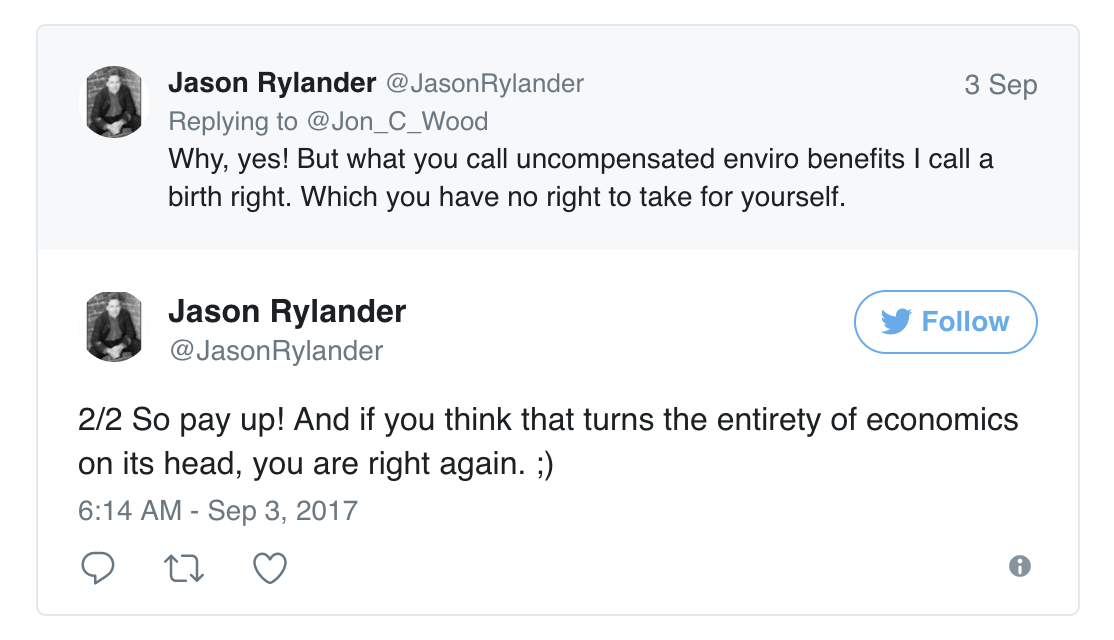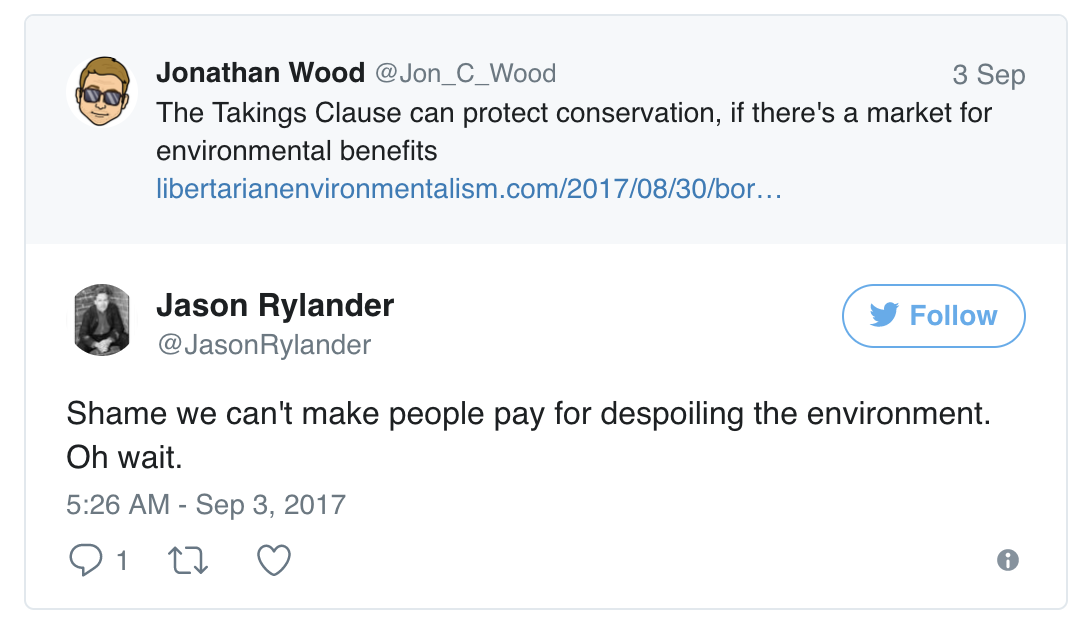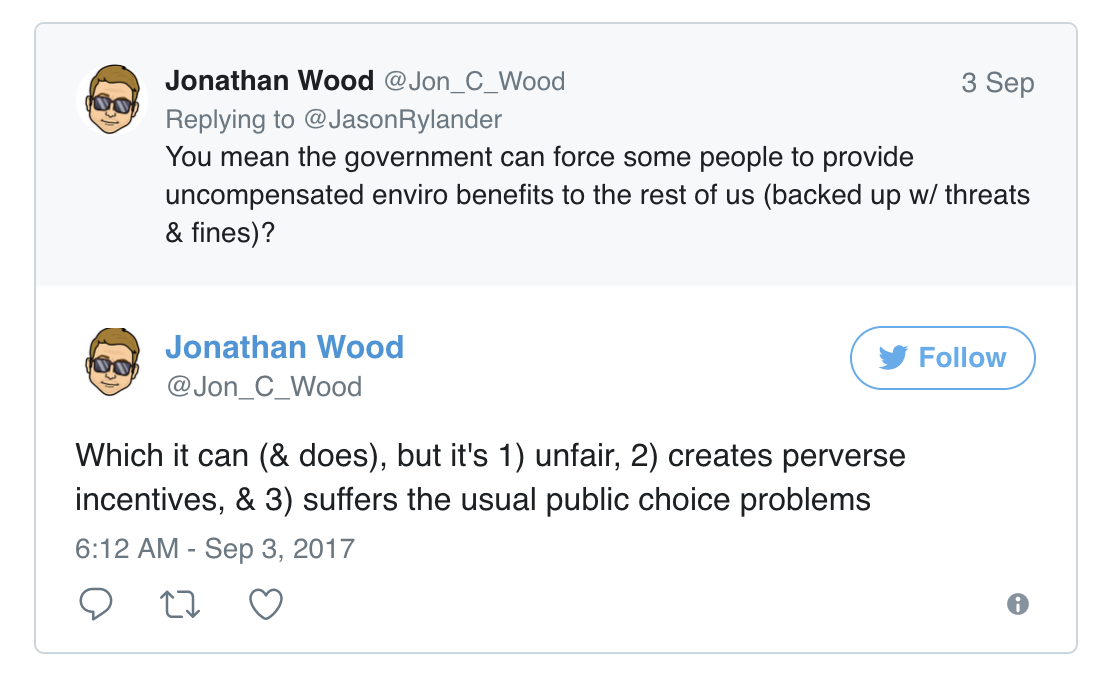An old criticism of socialism is that it measures virtue by how generous someone is with other people’s money. Many environmentalists measure virtue in a similar way: their support of government policies that force other people to provide environmental benefits to the rest of us. It’s a symptom of the increasing politicization of everything.
I was reminded of this during a recent twitter exchange with Defenders of Wildlife’s Jason Rylander:

It’s important to be clear what Jason is referring to as “a birthright”: it’s the right to use government power to control other people’s property, without paying them anything for it. Jason was responding to a blog post arguing that if more environmentalists embraced free market environmentalism—using property rights and voluntary agreements to protect species habitat, wetlands, and other environmental values on private land—those values would be protected by the Takings Clause and insulated from political whim. Instead of purchasing these rights from property owners, he responds that we should simply declare that “we” (the government) already own them. Inevitably, this means threatening, fining, or imprisoning people for actions that most of us take for granted. [Note that the blog post was about private land regulation, not public land regulation, air pollution, or climate change. So I take his “birthright” comment in that context.]
Why are some so cavalier about other people’s property? I think it’s likely because the burdens are not evenly distributed; they’re imposed haphazardly on a small subset of property owners—primarily rural property owners. Thus most environmentalists (especially urban dwellers) face no realistic prospect that they’ll bear any of the burdens they’re voting for. Apartment dwellers, like me, don’t have to worry that our living rooms will be invaded by an endangered species, locking us out of it while requiring us to continue to pay the rent.
You could imagine an alternative universe where the government declared that existing habitat and wetlands weren’t enough—that substantial resources were required to build more. Would supporters of heavy-handed regulations cheer if the government announced that the funding would come from confiscating half of the retirement savings of every political environmentalist? I think not.
Yet I suspect their objections to that scheme would be precisely the same objections they reject when raised by the unfortunate property owner who bears the burdens of environmental regulations. They would probably object that it’s unfair to make them provide a public benefit, rather than relying on broadly applicable taxes. That’s precisely the argument property owners make against confiscatory regulation, rather than relying on compensation and positive incentives. Why should some rural property owners bear the brunt of environmental regulations when city dwellers and others aren’t expected to make similar sacrifices?
Alternatively, political environmentalists could object that confiscating half of their retirement savings is harsh and jeopardizes their financial future. Property owners also object when 50%, 70% or 90% of their land, which they may depend on for retirement income, is locked up by habitat or wetlands regulations. But, for property owners, political environmentalists argue that the Takings Clause should be construed narrowly, to allow the government to regulate away much of a land’s value without paying any compensation. Only if the government takes absolutely everything, many argue, should the landowner be paid. So it would be extremely hypocritical for anyone who opposes compensation for property owners to object to the government confiscating 50%, 70%, or 90% of their retirement savings. (Mind you, they’d be right to object, but so is the property owner who is forced to provide uncompensated environmental benefits.)
Those would probably be the most visceral, immediate objections. But some would also rightly object that confiscating some people’s retirement savings, but not others, would create perverse incentives. By imposing a huge tax on political environmentalists, the government would discourage people from identifying with those views or encourage them to change their views, undermining political support for lots of environmental issues. Similarly, by imposing burdensome regulations on those property owners who have left their land as habitat or wetlands, but not those who haven’t, environmental regulation routinely create perverse incentives to destroy the environmental benefits regulation is intended to protect.
Public choice also tells us that confiscating some people’s retirement savings would be subject to political manipulation, with the politically powerful lobbying for carve-outs to reduce their burdens, concentrating them even further on those who lack political influence. The same is true of environmental regulation. Powerful, wealthy corporations can more easily navigate the bureaucracy than politically powerless property owners. And regulatory capture threatens to convert environmental regulation into a tool for squelching competition.
If using political power to force some people to provide environmental benefits for the rest of us isn’t virtuous, how should an environmentalist measure virtue? I think it’s measured in the positive things people do, at their own expense, to improve the world around them.
In the spirit of giving credit where it is due, Defenders of Wildlife (the organization for which Jason works) has done many praiseworthy things (other than lobbying for more regulation). One of its major projects has been to recover the gray wolf in the lower 48. Recognizing that this recovery comes at a significant cost for some property owners, the organization set up a trust fund to compensate ranchers for animals lost to wolf predation. In Defenders of Wildlife’s own words:
Our goal is to shift economic responsibility for wolf recovery away from the individual rancher and toward the millions of people who want to see wolf populations restored. When ranchers alone are forced to bear the cost of wolf recovery, it creates animosity and ill will toward the wolf. Such negative attitudes can result in illegal killing.
That sentiment is correct, and applies to environmental conflicts far beyond the gray wolf. Using the political process to force others to further your values at their expense isn’t virtue. The virtuous are the land owner who voluntarily restores habitat on his property, the environmentalist (or environmental group) that uses its own money to conserve wetlands, and the entrepreneur who puts her time and talents to finding new ways to use technology and markets to reduce environmental impacts (what PERC calls enviropreneurs).
This post originally appeared on FREEcology. All opinions are Wood’s own and do not necessarily represent the views of the Pacific Legal Foundation.





